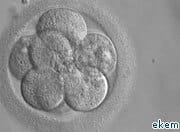The UK is one step closer to creating three-parent babies, following the release of draft regulations on a controversial technique yesterday.
The Department of Health launched a consultation on the procedure which results in a child with two mothers and a father – despite ethical and safety concerns.
Peter Saunders, head of the Christian Medical Fellowship, raised concerns that the consultation is asking “how” not “whether” this technique should be carried out.
Regrettable
He said: “It is deeply regrettable that the government intends to press on recklessly with this controversial technology in real patients in the face of genuine concerns about safety, effectiveness and ethics which have so far prevented its implementation anywhere else in the world.”
And Dr David King, director of campaign group Human Genetics Alert, warned that “inheritable human genome modification” is banned in all other European countries and has not been “debated adequately”.
“The techniques have not passed the necessary safety tests so it is unnecessary and premature to rush ahead with legalisation”, he said.
Risks
The technique would reportedly eradicate mitochondrial disease by replacing the nucleus in a healthy donor egg with the nucleus DNA from the prospective mother – resulting in a baby with DNA from three parents.
But Dr King said that making it possible for a mother with mitochrondrial disease to be genetically related to her baby “cannot justify the unknown risks to the child or the social consequences of allowing human genome modification”.
Last year the Government announced that it would be backing the technique following a public consultation by the fertility watchdog.
Devastating
The Human Fertilisation and Embryology Authority (HFEA) claimed there was broad public support for the procedure, but Dr King argued that the consultation was “utterly biased” and “inadequate”.
Dame Sally Davies, the Government’s chief medical officer, said: “Allowing mitochondrial donation would give women who carry severe mitochondrial disease the opportunity to have children without passing on devastating genetic disorders.”
“It would also keep the UK at the forefront of scientific development in this area”, she added.
Parliament
Parliament is expected to debate and vote on the regulations later this year.
This week advisors to the US federal Food and Drug Administration (FDA) raised concerns about the technique, warning that the research into it may not be as advanced as supporters of the procedure claim.

